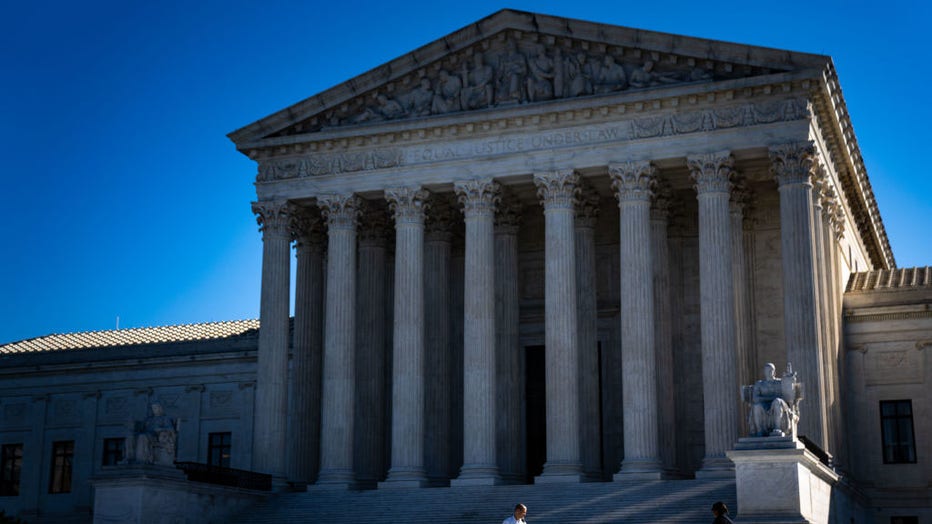Texas law requiring age-verification for porn sites heads before Supreme Court Wednesday
PREVIOUS COVERAGE: Texas porn law among cases in front of SCOTUS
The Supreme Court of the United States kicked off its new term on Monday. Texas' porn law that led PornHub to stop operating in the state is among the cases that will be argued in front of the high court.
A Texas law requiring pornographic websites to verify the age of users before allowing them access will go before the Supreme Court on Wednesday.
A group representing the adult entertainment industry is challenging the law, saying that it violates the First Amendment.
Texas argues that minors are too easily able to get around current age-verification requirements.
The Biden administration is expected to share argument time with the Free Speech Coalition.
The legal challenge could have an impact on several states which have passed similar legislation.
Texas Age-Verification Law
The backstory:
The Texas Legislature passed House Bill 1181 in June 2023.
The law requires commercial entities that show sexual material to "use reasonable age verification methods […] to verify that an individual attempting to access the material is 18 years of age or older."
The law applies to any website with one-third of content considered obscene for minors.
A federal court in Austin initially kept the state from enforcing the requirement, but the 5th Circuit Court of Appeals lifted the order.
Several pornographic websites cut off access to Texans under the threat of a lawsuit from Texas Attorney General Ken Paxton.
Companies that do not comply with the law could face large fines.
Age verification laws have been passed in Louisiana, Arkansas, Oklahoma, Kansas, Nebraska, Indiana, Kentucky, Tennessee, Mississippi, Alabama, Georgia, South Carolina, North Carolina, Virginia, Florida, Utah, Idaho and Montana.
Free Speech Coalition v. Paxton: Each side's argument

FILE - The Supreme Court of the United States is pictured on Tuesday, Oct. 11, 2022, in Washington, D.C. (Kent Nishimura / Los Angeles Times via Getty Images)
Free Speech Coalition:
The Free Speech Coalition, which is representing the adult entertainment industry, calls the Texas law a "drastic step" that is restricting adults from seeing content that is protected by the First Amendment.
In a brief, it argues that requiring sensitive information to be shared in the age-verification process could deter adults from seeing content they are allowed to access.
The Free Speech Coalition is calling for the state of Texas to enact a more narrow law.
"If Texas had devoted just some of the resources it spent condemning pornography to instead promoting content filtering, it could have equipped parents with a tool far better than age verification for keeping sexual content away from kids. Instead, Texas has thrown up its hands and imposed a blunt age-verification mandate that burdens massive numbers of adults seeking to access constitutionally protected speech," lawyers for the Free Coalition wrote in a brief.
They are calling for the Fifth Circuit Court of Appeals ruling to be reversed.
Texas:
Attorney General Ken Paxton and his team argue that its restrictions are consistent with the Constitution and that websites are not doing enough to protect children from seeing the "unlimited amounts of hardcore pornography" online.
The state argues that as the internet has become more complex, age-verification tactics used by many adult websites have largely remained the same.
Texas is calling for the court to overrule the 2004 decision Ashcroft v. American Civil Liberties Union (II), which determined the Child Online Protection Act, passed in 1998, was unconstitutional.
"Given the infancy of the internet and the rudimentary technologies at issue, no one then credibly could have claimed that age-verification technology reliably and easily distinguished adults from minors. Furthermore, online obscenity has grown much more dangerous for kids as the volume, production quality, and algorithm usage increases—and will grow even more dangerous as AI becomes more entrenched. The world has changed," wrote the state in a brief.
Paxton's team also argues that enforcement of HB 1181 should be allowed to continue with the suit continues, saying "the sky has not fallen" in the year it has been in effect.
They are calling for the Supreme Court to affirm the Fifth Circuit Court of Appeals' ruling.
Supreme Court Arguments
What we know:
The case, Free Speech Coalition v. Paxton, will be heard on Wednesday.
Derek L. Shaffer will argue on behalf of the Free Speech Coalition.
Solicitor General Aaron L. Neilson is expected to argue for Texas.
Arguments are expected to last 65 minutes.
Paxton is expected to speak and take questions following the end of the arguments in the case.
When is a decision expected in Free Speech Coalition v. Paxton?
What's next:
No decision is expected in the case right away.
The Supreme Court typically announces decisions in May and June.
The Source: Information in this article comes from briefs filed in Free Speech Coalition v. Paxton, past FOX coverage and the Supreme Court docket.

